Business
Economic woes dominate as Bolivia prepares to go to the polls
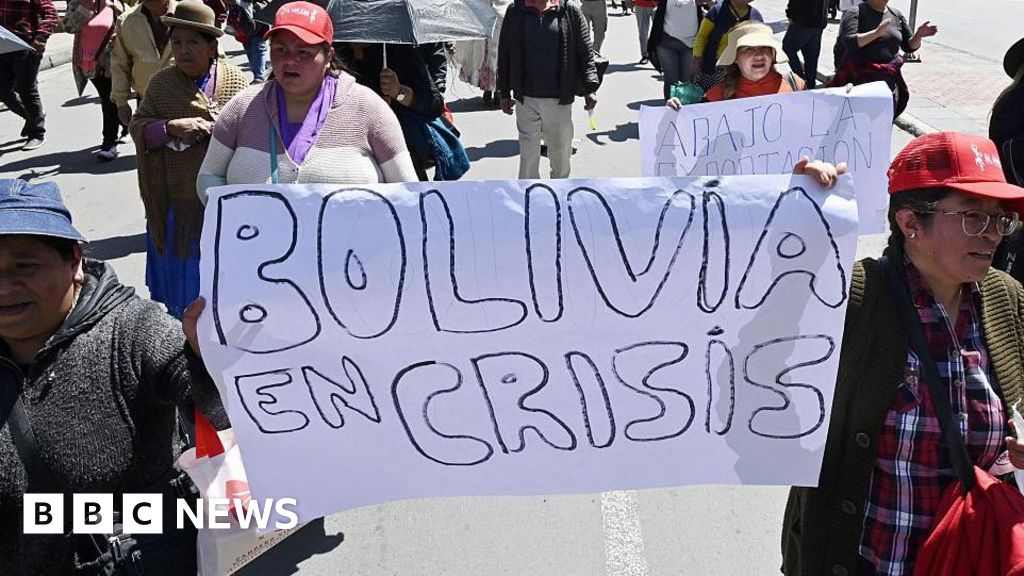
Business reporter
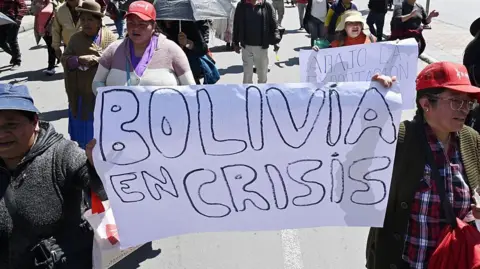 Getty Images
Getty ImagesAs Bolivians prepare to vote in a general election, the country’s deep economic woes are the central issue. Whoever becomes the nation’s next president faces a very difficult job to try to sort out the mess.
El Alto is Bolivia’s second-largest city, home to 1.2 million people. And, at an elevation of 4,150m (13,615ft), it is the world’s highest city with a population of more than 100,000.
It’s full of narrow streets with vendors trying to sell you everything from oranges to knock-off designer trainers. Standing on a pavement, car mechanic Josue Macias is enjoying an ice cream with his young son.
He describes how Bolivia’s sky-high inflation is affecting him and his family. The annual rate soared to 24% in June.
“Prices for everything are going up, but we are still earning the same,” he says. “We are just about getting by, but it’s hard because food prices are rising all the time, things like meat, oil and eggs. They are double or triple what they used to be.
“We’ve had to tighten our belts. We don’t go out to eat in restaurants anymore. Instead, I’m here on the street having an ice-cream with my son!”
Bolivia’s inflation spike has been caused by a combination of factors. Falling natural gas production and therefore exports of this key foreign earner has led to a decline in overseas revenues.
In turn, this has meant a shortage of US dollars, making it harder and more costly for the country to import petrol, diesel and food stuffs, leading to shortages and price hikes. It has led to street protests across the country.
At some petrol stations across the country, lorry drivers often have to wait more than 24 hours to fill up.
Taxi driver Gonzalo Ris is frustrated. As we drive along the pot-holed streets of La Paz, the country’s administrative capital, he tells me about his struggles.
“Before it was easy to fill up with petrol. Now I must wait for around four to six hours at the gas pump to get some, and that’s too much. It’s such a waste of time.
“And the prices are so expensive,” he adds. “Now the money we earn doesn’t cover our costs. But we can’t put our fares up because if we do, we won’t have any customers. It would be too expensive for them.”
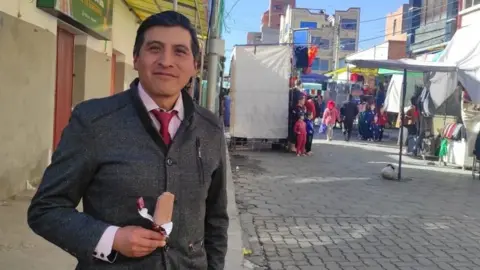
For almost 20 years the Bolivian government kept fuel prices artificially low through subsidies. This started when the government of then President Evo Morales nationalised the country’s hydrocarbon sector in 2006.
But in 2023, state energy company YPFB said Bolivia was running out of domestically-produced natural gas, due to a lack of investment in new exploration.
Without this gas to export, the Bolivian government is struggling to continue to find the funds to subsidise petrol and diesel. Last year it spent $2bn (£1.5bn) on such subsidies, according to a recent statement by a former minister of hydrocarbons and energy.
Outgoing left-wing President Luis Arce, who is not seeking re-election on 17 August, blamed the Bolivian parliament for the fall in natural gas production, accusing MPs of blocking vital oversea loans. His opponents in turn blame him for the economic turmoil.
The official exchange rate of Bolivia’s currency, the bolivianos, is certainly not helping matters. Since 2011 the government has fixed the exchange rate at 6.96 bolivianos to one US dollar.
But unofficially you can get 14 to 15 bolivianos per dollar. This has led to a thriving black market, especially of exports, from which the government misses out on tax revenue.
Economist Gary Rodriguez, the general manager for the Bolivian Institute of Foreign Trade, explains: “A product that costs seven bolivianos here in Bolivia can be sold for 15 bolivianos abroad,” he says.
“The problem is that businesses would prefer to sell items on the [overseas] black market rather than here in Bolivia which leads to food and fuel shortages.”
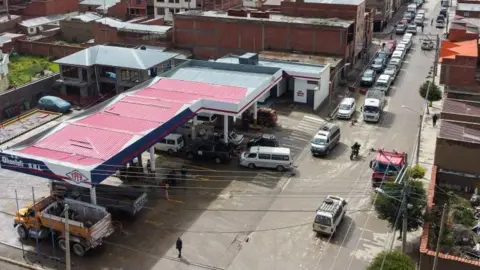 Getty Images
Getty ImagesRestrictions on the use of credit cards is another headache for Bolivia’s business community.
“The problem with the credit cards is that all the banks have limits that are ridiculous,” says Alessandra Guglielmi, who owns a food business called The Clean Spot.
“You can [only] spend around $35 a month over the internet with online purchases. $35 is nothing for a business.”
She is concerned about her business going under.
“I am worried with food prices going up I can’t afford to pay my staff a decent salary,” says Ms Guglielmi. “I am worried about the people not being able to afford to buy my products because I must put the prices up.
“And I am worried because my margins have gone down so it’s very hard right now for me to keep a business.”
Many people in Bolivia are hoping that a new government will be able to turn the country’s fortunes around. Two right-wing candidates are currently ahead in the polls for the presidential race.
Leading is Samuel Doria Medina of National Unity Front. He was previously the main shareholder of Bolivia’s largest cement manufacturer.
In second place is Jorge Quiroga of Freedom and Democracy. He has been president of Bolivia before, from 2001 to 2002.
If no candidate gets more than half the votes on 17 August – which no-one is expected to achieve – then there will be a second round of voting on 19 October.
Bolivian political scientist and analyst Franklin Pareja is sceptical that the next administration will be able to improve most people’s lives.
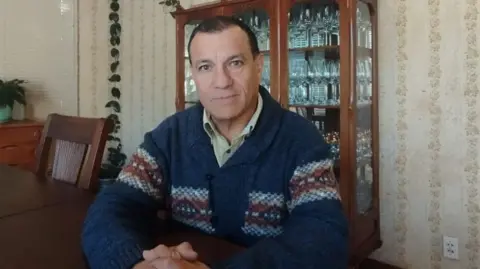
“The population is assigning a change in government almost magical qualities, because they think that with a change of government we’ll return to stability and prosperity,” he says. “And that’s not going to happen.
“Bolivia will only feel the hard impact of the economic crisis with a new government, because it will make structural economic changes, which will be unpopular.”
Mr Rodríguez is adamant that the Bolivian economy needs to be significantly altered. “We need to change the model, because the current model, has too much emphasis on the state,” he says.
“There are two actors, one the state sector and the other the private sector. The driver of development must be the citizen, the entrepreneur, and for that, the state must do what it’s meant to do. In other words, good laws, good regulations, good institutions.”
While polls suggest Bolivia’s next administration is likely to be right-wing, such radical governmental and economic change, to significantly reduce the state’s role, is not expected.
Business
Pakistan Stock Exchange staged a strong comeback – SUCH TV

Pakistan Stock Exchange (PSX) on Friday staged a strong comeback, breaking the long bearish momentum as snowballing forex reserves have lifted investor sentiment.
During intraday trading, the PSX’s benchmark KSE-100 index gained a whopping 3,146.23 points to climb to 184,602.56 points, marking a positive change of 1.70%.
Out of 562 active companies, share prices of 375 advanced and of 67 declined while rates of 120 companies remained unchanged.
Economic analysts said the uptick offered some breathing space for the economy, even as the country continued to keep a close watch on external inflows and outflows.
Pakistan’s foreign exchange reserves inched up by $16 million over the past week, according to figures released by the State Bank of Pakistan.
The central bank said its official reserves rose from $16.0557 billion to $16.0718 billion, showing a modest gain during the week.
Overall, the country’s total reserves climbed to $21.2484 billion.
The State Bank also noted that commercial banks’ holdings went up by $5.6 million, reaching $5.1927 billion.
The central bank projects the FY26 current account deficit at 0–1% of GDP and sees reserves at $17.8 billion by June 2026 with planned official inflows.
A day earlier, the stock exchange dropped by over 1,100 points due to massive selling pressure.
The PSX had extended losses after recording an increase for a brief period as investors seemed cautious amid rising geopolitical tensions involving Iran.
During intraday trading, the KSE-100 index touched 183,717.53 due to strong buying in the early sessions before it turned bearish by losing 69.29 points to close at 182,500.52 points.
International officials have warned that US military intervention in Iran now appears likely and could take place within the next 24 hours amid sharply escalating tensions in the Middle East.
American, European and Israeli sources said preparations for possible action were under way as Washington began evacuating personnel from its major air base in Qatar.
Business
Those with MGNREGA cards to get work during transition to G RAM G Act – The Times of India

NEW DELHI: People with job cards assigned under Mahatma Gandhi National Rural Guarantee Scheme will be able to get work without disruption when transition takes place to new rural employment framework under Viksit Bharat-Guarantee for Rozgar and Aajeevika Mission (Gramin) Act.Even though exact timeframe is not known yet, rural development ministry officials said the VB-G RAM G scheme will come into force in the coming financial year after the Centre frames and notifies the rules. After govt notifies the Act’s commencement date, states will get six months to make their schemes to enable implementation of the law.To ensure there is no disruption and job guarantee is upheld during transition from MGNREGA, it has been proposed to enable workers to use the same job cards issued under MGNREGA with Aadhaar-based eKYC.The officials said that as of now, around 75% of job cards have been verified with eKYC under the ongoing scheme. Moreover, ongoing projects under MGNREGA, if incomplete when the transition happens to the new scheme, would stay on course.Meanwhile, work is on to frame rules, lay out regulations on normative allocations, fund flow plan, IT framework, a national-level steering panel and social audits.Under the new law, focus will be on transparency to weed out leakages and duplicacy of work,the social audit system will be strengthened, and technology leveraged to create systems to establish work progress, timely wage payment and accountability through ‘e-measurement’ books, sources said. Demand for work will have to be entered on a digital platform. Officials made it clear the new law in no way interferes with demand-driven character of the scheme.
Business
Gurugram Attracts Rs 86,588 Crore In Real Estate Investments In 2025 As RERA Clears 131 Projects

Last Updated:
Alongside rising investments, Gurugram RERA strengthened regulatory oversight to safeguard homebuyer and investor interests

Gurgaon Real Estate (Representative Image)
Gurugram emerged as one of India’s top real estate investment destinations in 2025, with projects worth Rs 86,588 crore receiving regulatory approvals during the year, according to data from the Gurugram Real Estate Regulatory Authority (Gurugram RERA).
Market observers said the numbers reflect strong investor confidence in the NCR’s largest commercial and residential hub.
Gurugram RERA registered 131 projects in calendar year 2025, representing development potential of 35,455 units across housing and commercial segments.
A striking feature of the data was the dominance of large-ticket projects. Just 28 major developments accounted for investments worth Rs 59,360 crore, highlighting the growing influence of institutional capital and large developers in shaping Gurugram’s property market.
Residential assets continued to attract the bulk of investment interest. Of the total units approved, 31,455 were residential, underscoring sustained end-user demand and long-term confidence in the city’s housing fundamentals.
According to Authority data, the residential mix included 17,405 group housing units, 5,720 mixed land use units, 4,040 residential floor units, 2,122 affordable group housing units, 1,954 units under the Deen Dayal housing scheme, and 214 residential plotted colony units.
Market observers said this diversified supply pipeline indicates capital deployment across both premium and mass segments, helping reduce concentration risk and deepen market resilience.
On the commercial side, Gurugram RERA approved about 4,000 commercial units, of which 168 were dedicated to IT parks, reinforcing Gurugram’s position as a preferred hub for technology firms and Global Capability Centres.
Analysts noted that the combination of office-led employment growth and residential expansion continues to make Gurugram attractive for long-term capital deployment.
Industry experts said the scale of investments approved in 2025 highlights Gurugram’s ability to attract capital despite global uncertainty, supported by infrastructure growth, a strong corporate base and an improving regulatory environment.
“With a large pipeline of approved projects and sustained interest from developers and institutional investors, Gurugram is expected to remain a key real estate investment destination in the coming years,” a Gurugram-based real estate expert said.
Tighter regulatory checks
Alongside rising investments, Gurugram RERA strengthened regulatory oversight to enhance transparency and safeguard homebuyer and investor interests.
“These steps included stricter scrutiny of developer submissions, mandatory site inspections by domain experts, and public consultation through mandatory notices before project registration,” an Authority official said.
January 16, 2026, 07:44 IST
Read More
-

 Politics1 week ago
Politics1 week agoUK says provided assistance in US-led tanker seizure
-

 Entertainment1 week ago
Entertainment1 week agoDoes new US food pyramid put too much steak on your plate?
-

 Entertainment1 week ago
Entertainment1 week agoWhy did Nick Reiner’s lawyer Alan Jackson withdraw from case?
-

 Sports5 days ago
Sports5 days agoClock is ticking for Frank at Spurs, with dwindling evidence he deserves extra time
-

 Business1 week ago
Business1 week agoTrump moves to ban home purchases by institutional investors
-

 Sports1 week ago
Sports1 week agoPGA of America CEO steps down after one year to take care of mother and mother-in-law
-

 Tech3 days ago
Tech3 days agoNew Proposed Legislation Would Let Self-Driving Cars Operate in New York State
-

 Business1 week ago
Business1 week agoBulls dominate as KSE-100 breaks past 186,000 mark – SUCH TV







